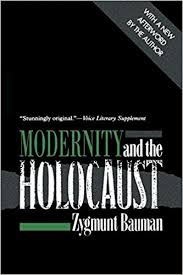Zygmunt Bauman
Modernity and the Holocaust

I first read Zygmunt Bauman’s Modernity and the Holocaust when it first came out as the Cold War was ending. I read it then primarily because Bauman was a key behind the scenes player in the first stages of the collapse of communism in his native Poland and had been exploring “big” sociological issues in his then 20 years in the UK. I returned to it now because it was assigned in a course I’m sitting in on that deals with the ways genocide and atrocity prevention theories can be used in the current crisis in the United States.
It was a difficult but important book for my purposes then and now.
 Bauman was one of the first scholars to put the Holocaust in a broader sociological context that explored its longer term or “upstream” causes as well as the specifics of Nazi ideology and public policy. While others have done so since, his book is worth reading because he thinks genocide of that sort is only possible as a byproduct of a fully modernized society.
Bauman was one of the first scholars to put the Holocaust in a broader sociological context that explored its longer term or “upstream” causes as well as the specifics of Nazi ideology and public policy. While others have done so since, his book is worth reading because he thinks genocide of that sort is only possible as a byproduct of a fully modernized society.
At the time, I thought the key to the book was his notion that we should not limit the study of the Holocaust to thinking of it as something that only happened to Jews. Rather, we needed to see it as part of broader historical patterns that apply to other people and other places.
Most of the people interested in genocide studies get that now. So, the real value of the book today lies in the way he links the evolution of what he and others call “modernity” to the possibility of genocide as we have come to know it—in the Holocaust of course, but also in Bosnia, Cambodia, Rwanda, and beyond.
As he sees it, genocide or the all but total elimination of a people can only be understood as a “rare, yet significant and reliable,” test of the hidden possibilities of modern society (12).” In the social science terminology I’m more comfortable with, modernity is a necessary but far from sufficient cause of genocide and other mass atrocities.
What is it about modern society? As he sees it, the Holocaust that almost cost him his life as a young man was possible only because of the kind of advances in science and bureaucratic organization Max Weber is often associated with. Hierarchy. Rules and procedures. Rationality. Separation of one’s “job” from one’s values. Putting people into categories that define and then separate them.
What he refers to as long-term intergroup enmity was nothing new. However, in a modern society with its factories and Weberian social structures, that vague enmity could be turned into both nationalistic hatred and be equipped with the tools to actually destroy a people and have the destruction carried out by what the historian (and my friend) Chris Browning calls “ordinary men.”
Frankly, I think Bauman missed some things about modernity, including the mass media. He could also have looked for counterexamples in which societies did not follow the kind of trajectory he outlines here.
Nonetheless, it’s a book worth considering as we begin to think about the rise of right wing populism in the west.
